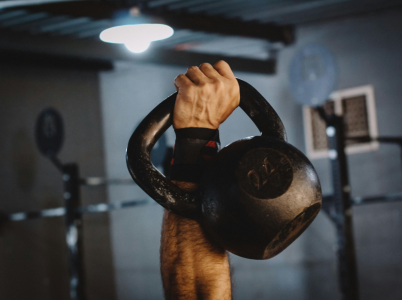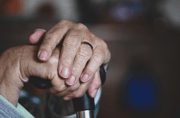Boost your health with just one handshake—find out how!
By
Aubrey Razon
- Replies 0
As we age, we track our health in many ways, but here's a surprising one you might be missing: grip strength. This simple test could reveal more about your health than you think.
Are you ready to unlock this secret to a healthier life?
Grip strength isn't just about impressing others with a firm handshake; it's a reflection of your muscular health and more.
When you clasp your fingers around an object, the force you exert is a measure of your grip strength.
This seemingly simple action is a telling sign of your overall muscular condition and can hint at potential health risks.
Researchers have found that grip strength is a reliable predictor of cardiovascular risks, brain health, and even longevity.
It's a metric that's easy to measure and can reveal a lot about what's happening inside your body. If you've ever struggled with a stubborn jar lid, you've encountered a direct experience of your grip strength—or a possible lack thereof.
Using a tool called a dynamometer, health professionals can measure the kilograms of force your grip generates.
While there's some debate over what constitutes a “weak” grip, studies suggest that for men, anything less than 26 kilograms (or 56 pounds) of force might be cause for concern.
For women, the threshold is around 16 kilograms (or 35 pounds), according to the Cleveland Clinic.
But why does this matter?
A weaker grip has been linked to a higher likelihood of heart disease, high blood pressure, chronic obstructive pulmonary disease, and even cognitive decline.
It's a sign of frailty, which isn't just a concern for the elderly. Frailty can begin to show as early as our mid-40s, particularly if we lead sedentary lifestyles.
The good news is that grip strength, and overall strength, can be improved with the right exercises and nutrition.
While hand-strengthening tools might seem like a quick fix, they don't offer the full-body benefits that come with more comprehensive exercise routines.
Resistance training is the gold standard for building muscle and staving off frailty.
It's not just about bulking up; it's about creating a reserve of muscle that helps your body resist the wear and tear of aging and recover more quickly from injuries or illnesses.
Cardiovascular exercises, such as cycling or walking, are also crucial for maintaining good circulation, which is vital for overall health.
Nutrition plays a pivotal role as well. Ensuring you're getting enough protein is essential for muscle development.
And let's not forget the brain benefits.
Regular exercise has been linked to improved mental health, including reduced cognitive deterioration and lower instances of anxiety and depression.
The key to a successful exercise regimen is finding activities you enjoy and can commit to regularly. Whether it's a daily 10-minute routine or a more extensive workout, consistency is what counts. Here are some expert-recommended exercises to consider:
Full-body workouts are the way to go for the most significant health benefits.
Remember, strength gains can happen quickly, with neurological changes occurring within the first week of exercise.
As your body becomes stronger, your grip strength will naturally improve, signaling positive internal changes that boost your overall health.
Before embarking on a new exercise routine, it's wise to consult with your doctor, especially to tailor a program that's right for your individual needs.
And don't forget, improving your grip strength isn't just about physical health; it's about empowering yourself to live life to the fullest, with the confidence that comes from knowing you're taking proactive steps to maintain your well-being.

We'd love to hear from you, our GrayVine community. Have you noticed changes in your grip strength? What exercises have you found beneficial? Share your experiences and tips in the comments below. Let's grip the future with strength and vitality, together!
Are you ready to unlock this secret to a healthier life?
Grip strength isn't just about impressing others with a firm handshake; it's a reflection of your muscular health and more.
When you clasp your fingers around an object, the force you exert is a measure of your grip strength.
This seemingly simple action is a telling sign of your overall muscular condition and can hint at potential health risks.
Researchers have found that grip strength is a reliable predictor of cardiovascular risks, brain health, and even longevity.
It's a metric that's easy to measure and can reveal a lot about what's happening inside your body. If you've ever struggled with a stubborn jar lid, you've encountered a direct experience of your grip strength—or a possible lack thereof.
Using a tool called a dynamometer, health professionals can measure the kilograms of force your grip generates.
While there's some debate over what constitutes a “weak” grip, studies suggest that for men, anything less than 26 kilograms (or 56 pounds) of force might be cause for concern.
For women, the threshold is around 16 kilograms (or 35 pounds), according to the Cleveland Clinic.
But why does this matter?
A weaker grip has been linked to a higher likelihood of heart disease, high blood pressure, chronic obstructive pulmonary disease, and even cognitive decline.
It's a sign of frailty, which isn't just a concern for the elderly. Frailty can begin to show as early as our mid-40s, particularly if we lead sedentary lifestyles.
The good news is that grip strength, and overall strength, can be improved with the right exercises and nutrition.
While hand-strengthening tools might seem like a quick fix, they don't offer the full-body benefits that come with more comprehensive exercise routines.
Resistance training is the gold standard for building muscle and staving off frailty.
It's not just about bulking up; it's about creating a reserve of muscle that helps your body resist the wear and tear of aging and recover more quickly from injuries or illnesses.
Cardiovascular exercises, such as cycling or walking, are also crucial for maintaining good circulation, which is vital for overall health.
Nutrition plays a pivotal role as well. Ensuring you're getting enough protein is essential for muscle development.
And let's not forget the brain benefits.
Regular exercise has been linked to improved mental health, including reduced cognitive deterioration and lower instances of anxiety and depression.
The key to a successful exercise regimen is finding activities you enjoy and can commit to regularly. Whether it's a daily 10-minute routine or a more extensive workout, consistency is what counts. Here are some expert-recommended exercises to consider:
- Walking: A simple, low-impact way to get moving.
- Swimming and water aerobics: Great for those with joint concerns.
- Yoga or chair yoga: Increases flexibility and strength.
- Gardening: A therapeutic way to engage your muscles.
- Resistance bands: Versatile and portable for strength training.
- Lifting weights: Deadlifts or dumbbell lunges can be done at home with household items.
Full-body workouts are the way to go for the most significant health benefits.
Remember, strength gains can happen quickly, with neurological changes occurring within the first week of exercise.
As your body becomes stronger, your grip strength will naturally improve, signaling positive internal changes that boost your overall health.
Before embarking on a new exercise routine, it's wise to consult with your doctor, especially to tailor a program that's right for your individual needs.
And don't forget, improving your grip strength isn't just about physical health; it's about empowering yourself to live life to the fullest, with the confidence that comes from knowing you're taking proactive steps to maintain your well-being.
Key Takeaways
- Grip strength is an important indicator of overall health and can predict potential health issues like heart disease, high blood pressure, COPD, and cognitive decline.
- Normal grip strength is measured by a dynamometer and varies based on factors such as BMI and sex.
- Improving grip strength involves full-body resistance training and cardiovascular exercises, not just hand-strengthening tools.
- Regular exercise, proper nutrition with adequate protein intake, and choosing activities you enjoy are crucial for building muscle, combating frailty, and promoting better brain health.







